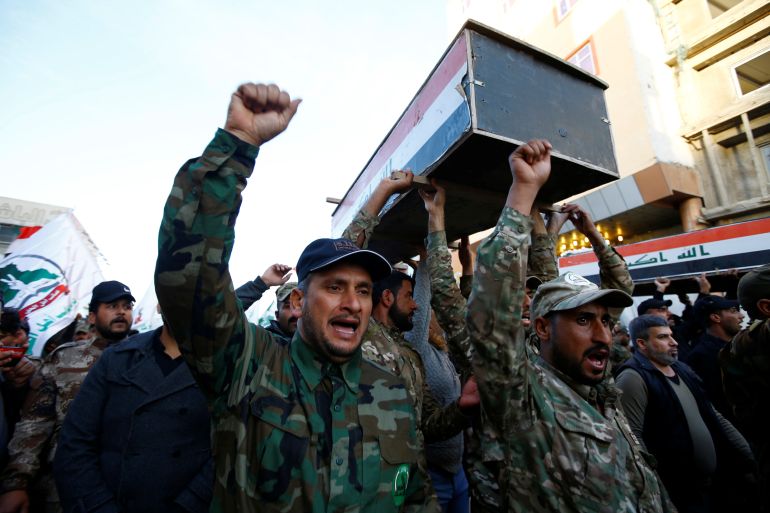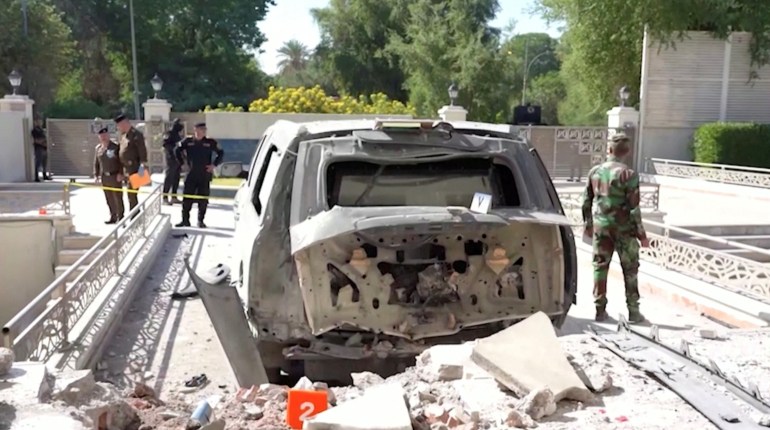Is Iran losing some of its grip on Shia militias in Iraq?
The assassination attempt on Iraqi PM Mustafa al-Kadhimi has brought the divisions within pro-Iran militias to the fore.

Baghdad, Iraq – Soon after the drone attack aimed at assassinating Iraqi Prime Minister Mustafa al-Kadhimi, Iran joined the ranks of countries condemning the attack.
Tehran, which wields considerable military influence in Iraq, rushed Esmail Qaani, the leader of the elite Quds Force to Baghdad to calm the most dramatic escalation in months between the state and the pro-Iran militia groups.
Keep reading
list of 3 itemsIraq’s prime minister decries ‘cowardly’ attack on his home
Uneasy calm in Baghdad after assassination attempt on Iraq PM
It is not clear whether Iran had previous knowledge of this attack, but Tehran’s subsequent stance following the assault suggested that the attack at least went ahead without Iran’s full endorsement.
At a tumultuous time when Iran’s influence in Iraq seems to be on the decline, Tehran’s once-firm grip on the Shia militias in the country is again brought into question.
Although no groups have yet claimed responsibility, security sources and analysts believe pro-Iran militia groups are the likely culprits behind the attack that came after the humiliating defeat of pro-Iran blocs in the October elections. They claim the election was rigged.
In his meeting with Prime Minister al-Kadhimi, Qaani also reportedly said that those who staged the attack would be investigated and later prosecuted.
“I found it hard to believe that the attack was authorised by Iran,” Sajad Jiyad, an Iraqi political analyst at Century Foundation, told Al Jazeera. “It probably has more to do with the unit whose commander was killed earlier, and they likely went ahead with the attack as revenge without going all the way up to the top leadership.”
Murky background
Despite its murky background, the attack nonetheless elevated the escalation to a worrying level. “Had the assassination been successful, we’d be looking at a potential full-blown intra-Shia conflict,” Raad Hasan, a Baghdad-based Iraqi politics watcher, told Al Jazeera.
After pro-Iran blocs suffered a significant blow in the parliamentary elections, Iran’s primary task is to fortify its base in Iraq while carefully tailor its game plan in Iraqi politics to retain its influence. Any extensive Shia-Shia conflict could potentially shatter Iran’s ambition in Iraq, according to analysts.
It is against this background that the recent dramatic escalation marked uncharted territory for Iran where the situation could have gone terribly wrong – all possibly without Tehran’s consent.
From the militia groups’ perspective, the attack made sense: it came as the furore among them continued to brew after influential Shia leader Muqtada al-Sadr held meeting after meeting in an apparent move to try to exclude the pro-Iran Al-Fatah political alliance, to which Hashd al-Shaabi or Popular Mobilisation Forces (PMF) belong, from the next government.
Al-Sadr emerged as a kingmaker after his political bloc made extensive gains in the elections, winning 73 seats in the 329-member parliament.
“They committed such a shocking act to warn everyone that if they are sidelined, they will burn the country,” Hamdi Malik, a researcher at the Washington Institute who has studied Iraqi militias extensively, told Al Jazeera.

Fissures between the Iraqi militias and Iran
Yet for Iran, such an attack was too risky – the escalation could easily alienate some Iraqis and bolden the militia groups into acting like lone wolves without relying too much on Tehran.
Already prior to the attack, the militia group Asa-ib Ahl al-Haq’s dissenting role within the ranks of the PMF had opened fissures between the Iraqi militias and Iran; and the attack on Sunday further worried Tehran as it fears its grip on the Shia militia groups is increasingly loosening.
For months, Iran-backed Shia militia groups in Iraq have been behind the tit-for-tat exchanges with the US with mortar and rocket attacks aimed at US military sites in Iraq – oftentimes in defiance of Tehran’s de-escalatory stance with Washington on Iraqi soil.
Among the militia groups in Iraq themselves, the internal fracture was also widening as Asa’ib Ahl al-Haq group, led by Qais Khazali, repeatedly broke the periodical ceasefire between Kata’ib Hezbollah (KH) – another paramilitary group traditionally loyal to Tehran – and the US.
According to Militia Spotlight, an open-source monitoring site established by Washington Institute, Asa’ib Ahl al-Haq broke the ceasefire between Kata’ib Hezbollah and the US at least half a dozen times in 2020 and 2021, in deliberate defiance of KH’s dominant role in Iran’s proxy militia network in the country.
“Iranian-supported groups like Kata’ib Hezbollah are themselves fragmenting with some elements acting more aggressively against the US and against election results than Iran is willing to support,” Michael Knights, a fellow at Washington Institute, told Al Jazeera.
The very militia groups that are financially and militarily backed by Iran are acting more independently as their political influence is in fast decline within Iraq and their financial support provided by Tehran shrinks following the economic down spiral in Iran.
The US assassination of Qassem Soleimani, the leader of Quds Force, and PMF leader Abu Mahdi al-Muhandis undoubtedly struck a huge blow against Iran’s military influence within Iraqi borders.
The “undefeatable” and charismatic Soleimani as put by some Iraqis, had a much stronger personal sway than Qaani who does not speak fluent Arabic and lacks a consistent track record with the Iraqi muqawama (resistance).
“Ever since the killing of Soleimani and Muhandis, Iran has been struggling to keep cohesiveness in its control of and strategy in Iraq,” said Jiyad. “And with time, it’s almost inevitable that Iran is no longer able to exert the same level of power on some groups, and it would be very interesting to see how that is going to play out in the next government.”
Yet exactly how effective Iran’s grip on Shia militias is still debatable, and despite some apparent fracture between Tehran and some Iran-backed militias, some analysts believe Iran’s military influence is long-lasting and will not necessarily be drastically curtailed by the series of incidents.
“It’s a stretch to say that Iran is losing its grip on these militias,” Hamdi Malik said. “Iran might oppose an attempt on the life of the Iraqi prime minister, yet it sympathises with those trying to avoid losing their influence in the Iraqi parliament and government.”